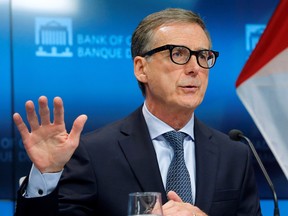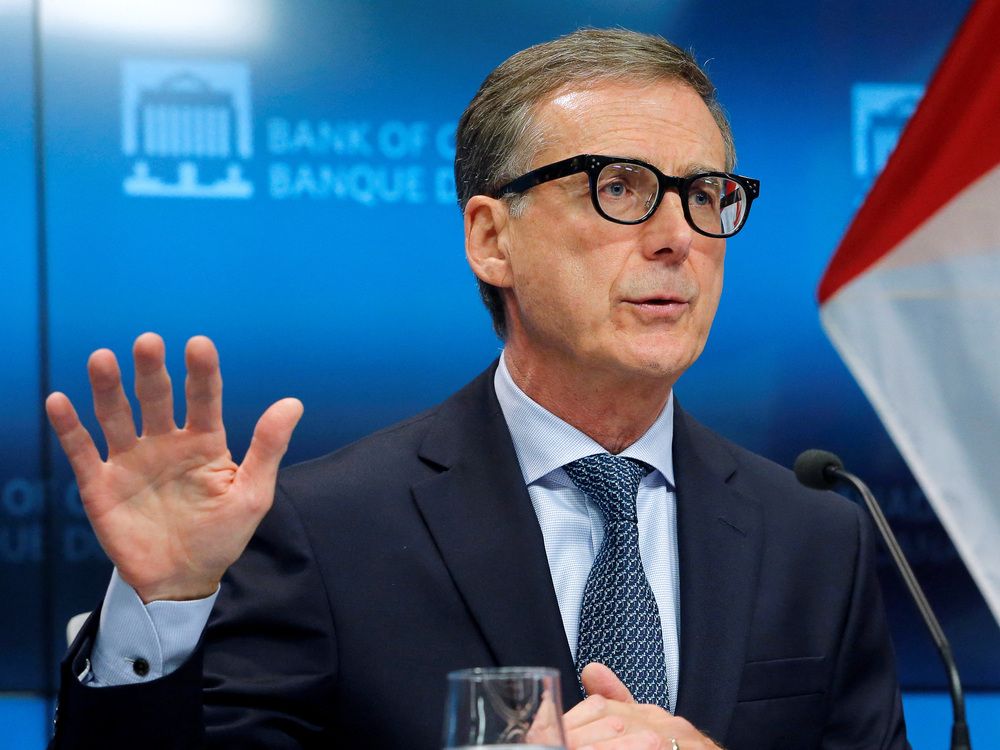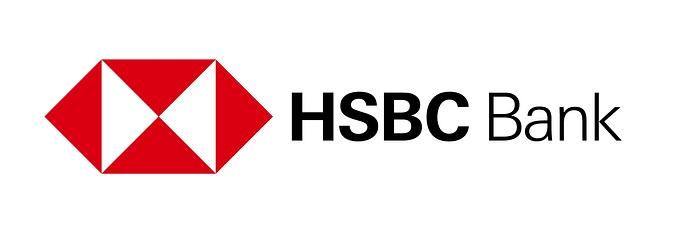Bank risks substantially weakening our economy, potentially throwing hundreds of thousands of Canadians out of work

Article content
Facing a one-two punch of sky-high prices on daily essentials combined with rising credit card, mortgage and other bills, the last thing Canadians need right now is a recession, which could mean massive job losses and economic upheaval. But that’s exactly what could happen if the Bank of Canada raises interest rates Wednesday for the seventh time in the past nine months.
Advertisement 2
Article content
The Bank of Canada, led by governor Tiff Macklem, has already raised interest rates faster than almost any other country. These hikes have left millions of Canadians facing eye-popping rises in credit payments. Combined, Canadians now owe $2.29 trillion in credit, according to TransUnion LLC’s Q3 2022 Credit Industry Insights Report. Rate hikes have even pushed the Bank of Canada itself into the red for the first time in history, with a loss of $522 million in the third quarter.
Article content
Article content
Central banks raise interest rates to cool the economy and slow inflation, but Macklem has been doing more than just tightening monetary policy. He has also been waging an ongoing public relations campaign against phantom wage growth, arguing that wages are fuelling inflation. There is zero evidence that wages are fuelling inflation. Statistics Canada’s labour force survey, released Friday, shows wage increases are lagging inflation, not driving it.
Advertisement 3
Article content
In a recent report from the Canadian Labour Congress and the Centre for Future Work called A Cure Worse than the Disease? Toward a More Balanced Understanding of Inflation and What to Do About It, economist Jim Stanford lays out evidence showing how wages are not the cause of inflation. Stanford points out that corporate Canada’s pricing power has been fuelling higher prices, resulting in corporate accounts being padded with sky-high, record profits. In 2022, corporate profits in Canada reached the largest share of gross domestic product (GDP) in Canadian history, or put another way, corporate profits grew three times faster than wages since 2019.
Despite all this, Macklem has stubbornly declared that the Bank of Canada will continue raising interest rates, even if it pushes our economy into a harmful recession. With the myopic policy focus on achieving the target inflation rate of two per cent, the bank risks substantially weakening our economy and potentially throwing hundreds of thousands of Canadians out of work.
Advertisement 4
Article content
-

Interest rates are going up this week: What you need to know about the Bank of Canada decision
-

Kevin Carmichael: Jobs numbers show Bank of Canada hasn’t wrecked the economy after all
-

FP Answers: The Bank of Canada lost $522 million in three months — here’s why
If the Bank of Canada is determined to manufacture an economic recession, we know the pain will not be shared equally. Just last week, the International Labour Organization (ILO) warned that global poverty and income inequality are on the rise worldwide while people’s purchasing power is falling behind. The ILO’s Global Wage Report recently warned that for the first time in history, real wages fell into negative territory in 2022, down 0.9 per cent, with low-income workers and households feeling the pinch most of all.
Advertisement 5
Article content
The ILO cautions that this not only puts the pandemic recovery at risk, but it could also fuel growing social unrest. As the inquiry into the Ottawa convoy occupation wraps up, and the U.S. hearings examining the Jan. 6, 2021 insurrection draw to a close, the prospect of a manufactured economic crisis driving growing social unrest is not one we should take lightly. Pouring more cold water on our economy now — and driving it into a damaging, monetary policy-induced recession — will only make things worse.
As Macklem announces the Bank of Canada’s interest rate decision this Wednesday, he should consider the well-being of the workers and families already paying the biggest price from the cost-of-living crisis. This should start with Macklem pushing pause on more interest rate hikes. Let’s take time to evaluate the impact of previous hikes before raising them any further.
Bea Bruske is president of the Canadian Labour Congress.



